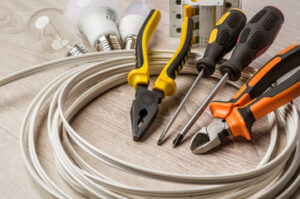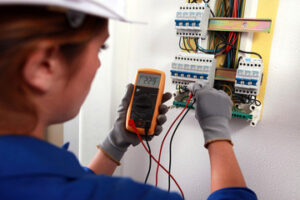Commercial electrical installation involves the setup of systems that distribute and utilize electricity safely within a commercial space. This includes wiring, circuit breakers, switches, lighting fixtures, and more.

It’s important to follow safety protocols during commercial electrical installations to prevent accidents and other hazards. This includes turning off the power supply before starting work and using insulated tools to minimise the risk of shock. Contact Jacksonville NC Electric for professional help.
Electrical systems are critical for commercial properties such as offices, malls, hotels and small industries. However, they can pose significant dangers if not properly installed and maintained. Commercial wiring requires higher voltage and more complex setups than residential ones. They must also be well-protected from hazards, like physical damage or fire. A professional commercial electrician can handle these installations safely and ensure that they adhere to relevant standards and regulations.
The first step in a commercial electrical installation is to assess and design the power distribution system. This involves evaluating a building’s electrical needs and creating a detailed plan for wiring, conduits, switchboards and brand circuits. It should also include factors such as voltage drop calculations and load balancing to maximize energy efficiency.
Moreover, the layout should be flexible to accommodate future changes in technology and building use. This will reduce maintenance costs and facilitate upgrades. Additionally, it is important to choose the right materials for the project, including wires and conduits. The best choice is metal cable assemblies, which are sturdy and offer maximum protection from hazardous conditions.
Finally, it is important to obtain all necessary permits and follow proper safety procedures during the process. This includes ensuring that all workers wear the appropriate personal protective equipment, and that they understand and follow all required safety protocols. It is also essential to make sure that all work is performed by a licensed professional, as non-compliance can lead to legal repercussions.
Design
Commercial electrical wiring systems are designed to meet the power demands of offices, buildings, malls, hospitals, restaurants, and other business premises. They include heavy-duty electrical wires that power equipment like air conditioning systems, lighting, elevators, and even sound systems and motors. These power systems also incorporate safety features to prevent fires and other electrical hazards.
During the design phase, engineers create electrical schematics that outline the power distribution, circuit connections, and wiring for the entire building. They use CAD and BIM tools to make these drawings clear and easy to understand. They then choose components such as transformers, panels, and circuit breakers based on load calculations and the specific needs of the establishment.
Another key consideration in the design process is ensuring that the system can accommodate future expansions and power requirements. This is important for businesses that often have to add new equipment or modify existing ones. Engineers also take into account energy-saving measures to minimize the facility’s energy consumption and environmental impact.
In addition to these essentials, many commercial properties also need decorative touches that improve the ambiance and overall appeal of the space. Fancy lamps, HD TVs mounted on the wall, and coffee stations are just a few examples of the kinds of extras that can boost productivity and morale. To ensure that these perks don’t compromise the integrity of the electrical system, they must be powered by separate dedicated circuits.
Installation
Electricity is complex, and it’s essential that commercial electrical installations are designed and installed properly. This includes following industry-specific standards, ensuring that safety protocols are adhered to, and regularly testing and inspecting the wiring of the property.
The installation process begins by assembling the necessary tools and materials, and ensuring that they comply with the relevant regulations. Once this is done, the electrician can start to set up the primary components of the electrical system. This includes the electrical service panel, which will serve as the central hub for power distribution, and a series of wiring runs that will connect to outlets, switches, and lighting fixtures. It is also important to install the appropriate breaker sizes for each circuit, and to ensure that all cables are properly secured to prevent physical damage or fires.
The final step is to test and inspect the electrical installation to verify that it meets all applicable safety standards. This process involves examining the installation for continuity, polarity, and resistance, as well as checking for faulty connections and signs of corrosion or wear and tear. If the installation passes inspection, it can be certified and registered with the relevant authorities. If it does not, the electrician will need to make repairs or re-test the installation.
Testing
Electricity is a vital component for many commercial properties. It powers devices and lights, and it supports essential operations like telecommunication and internet connectivity. It’s also dangerous and complex, requiring expert handling to ensure it meets safety standards and regulations.
Electrical installation and testing are crucial to the functionality and safety of commercial buildings. In addition to the basics, such as switches and outlets, power receptacles and lighting systems, they must include specialized equipment and technology like high-capacity transformers, motor control centers and variable frequency drives. They must also follow strict industrial requirements, including equipment grounding, arc flash protection and hazardous location considerations.
With time, wiring and connections can become damaged or worn down. These issues can result in overheated circuits, loss of power and potential fire hazards. Performing regular Electrical Installation Condition Reports (EICR) checks, or Fixed Wire Testing, can help identify problems and fix them before they cause serious damage.
Before an EICR, it’s important to prepare the property for inspection by noting any known changes and additions since the last one. You’ll need to book a qualified inspector and make sure key personnel are available to accompany them. Once the test is complete, review and agree with the findings. Identify any C1 hazards that need to be addressed immediately and request the electricians take steps to resolve them. Continuity and insulation resistance tests are also performed to check for defects that can affect current flow and lead to shocks or fires.
Inspection
Commercial properties require complex electrical systems to operate safely and efficiently. However, faulty wiring or poorly maintained equipment can cause fires and other hazardous situations that threaten the safety of building occupants and property damage. Professional inspections identify and fix these problems, helping commercial property owners avoid costly consequences.
Inspectors use a wide range of tools and materials to verify that the electrical installation complies with regulations and standards. They begin by checking the main electrical panel to ensure that it provides sufficient power distribution and that all devices, including circuit breakers, outlets, and switches, are rated for the current load. They also check that the electrical cables and wires are properly sized and installed. They examine the junction boxes, conduit pipes and other components to see that they have proper cover and insulation. Inspectors also look for any exposed live wires and unenclosed junction boxes.
A commercial electrical installation must meet stringent safety requirements, especially for high-risk facilities like hospitals and schools. Inspectors test outlets, switches, and circuit breakers for proper function and safety, looking for signs of overloading, overheating, and melting or burning insulation. They also inspect wiring, identifying bare copper conductors and ensuring that all connections are snug and secure. They may recommend changes to improve safety, such as installing smoke detectors and emergency systems. They also document their findings and recommendations. This documentation is important for compliance, legal issues, and insurance purposes.
Maintenance
Commercial electrical systems support the operations of a business, providing lighting, power outlets, switches, and networking cabling. These systems are prone to wear and need regular maintenance and repairs to ensure safety, operational efficiency, and compliance with regulations.
Professional electricians perform many critical services to maintain these systems. These include replacing corroded wires, upgrading outdated wiring, and performing testing to find faults or safety issues. They also offer routine electrical maintenance plans that prevent system failures and downtime.
Electrical issues can range from simple problems like flickering lights to major issues that put building occupants in danger. Faulty wiring, for example, poses serious fire hazards and may cause equipment damage if not addressed immediately. Professional electricians can identify these issues using thermal imaging, which finds overheating components that indicate faulty wiring or overloading.
Other commercial electrical services include backup generator installation, EV charging station setup, and LED lighting upgrades. These solutions improve energy efficiency and reduce operational costs, helping businesses grow with confidence and meet regulatory standards. Safety inspections and code compliance are also handled to minimize the risk of electrical accidents and reduce potential disruptions for a business.
